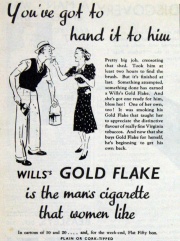W. D. and H. O. Wills
Wills of Bristol, maker of tobacco and tobacco products.
1761 Henry Overton Wills was born.
1786 The company was founded as Wills, Watkins and Co by Henry Overton Wills and his partner Watkins, who opened a shop in Castle Street, Bristol.
1789 After the retirement of his partner, it became Wills and Co
1815 The company was renamed W. D. and H. O. Wills
In 1826 his two sons, William Day Wills and Henry Overton Wills II took over the company.
The company pioneered canteens for the workers, free medical care, sports facilities and paid holidays.
1846 Henry Overton Wills III joined the company.
1871 Their first brand was “Bristol”, made at the London factory from 1871 to 1974.
1870s The company led the way in branding.
1878 Three Castles and Gold Flake followed in 1878.
1888 “Woodbine” appeared, ten years later.
In 1894 Capstan Cigarettes a brand of unfiltered British cigarettes made by Imperial Tobacco was launched.
In 1901, Sir William Henry Wills and others formed the Imperial Tobacco Co from a merger of Wills with seven other British tobacco companies. Imperial remains one of the world's largest tobacco companies. When the company merged with the others, the company was the dominant company with a value at just under £7 million.
1914 “Embassy” was introduced.
The company had factories and offices not only in Bristol, but also in Swindon, Dublin, Newcastle and Glasgow.
1962 "Embassy" was relaunched with coupons.
The last member of the Wills family to work in the company was Christopher, the great-great-grandson of H. O. Wills I. He retired as sales research manager in 1969.
1974 The largest cigarette factory in Europe was opened at Hartcliffe, Bristol and closed in 1990. The large factory and warehouse buildings remain prominent buildings on Bristol Harbour, though they have now been converted to other uses, such as the Tobacco Factory Theatre.
1986 The Newcastle factory closed and stood derelict for over a decade, before the front of the Art Deco building - which was preserved by being Grade II listed - reopened as a block of luxury apartments in 1998.
1988 The Wills brand was withdrawn in Britain.
See Also
Sources of Information
- [1] Wikipedia
- Trademarked. A History of Well-Known Brands - from Aertex to Wright's Coal Tar by David Newton. Pub: Sutton Publishing 2008 ISBN 978-0-7509-4590-5
- Made in Bristol by David Bolton. 2011. ISBN 978 1 904537 91 5




















